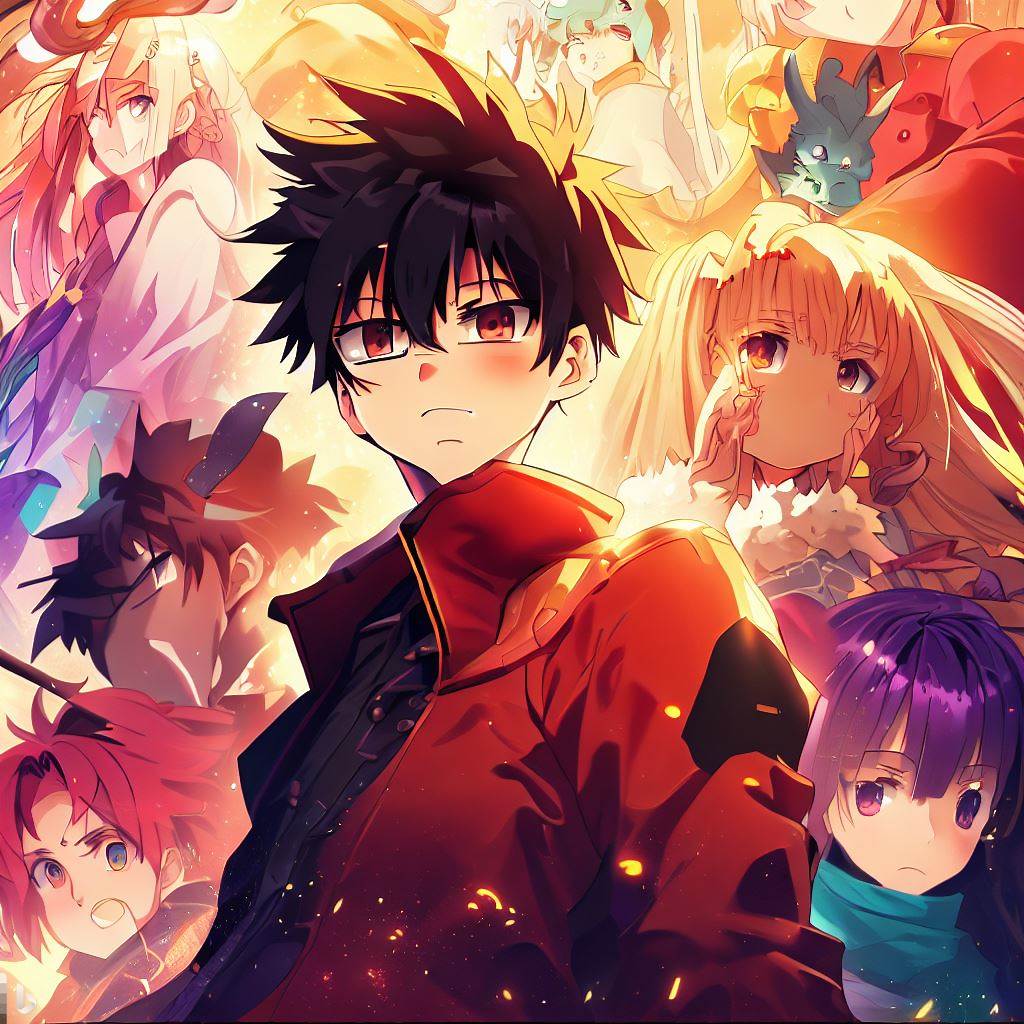Anime series refers to animated television shows or web series that originate from Japan. These series cover a wide range of genres, including action, adventure, romance, fantasy, science fiction, horror, and more. They often feature vibrant artwork, distinct character designs, and compelling story lines that appeal to both Japanese and international audiences.
Anime, a captivating form of Japanese animation, has garnered a massive global following, captivating audiences with its diverse genres, rich storytelling, and stunning visuals. This article aims to provide an insightful overview of anime series, shedding light on its unique characteristics, historical significance, and the reasons behind its widespread appeal. Furthermore, we delve into the enthralling realm of anime by presenting a carefully curated list of the 100 best anime series of all time, celebrating the creations that have left an indelible mark on the medium.

Understanding Anime Series:
Anime series refer to animated television shows or web series produced in Japan, characterized by their distinct art style, diverse storytelling, and captivating characters. These animated series cover a wide range of genres, themes, and target audiences, making them a versatile and popular form of entertainment both within Japan and internationally. To fully comprehend anime series, it is essential to delve into its origins, key characteristics, and cultural significance.
1. Definition and Origins of Anime:
Anime, short for “animation” in Japanese, is a term that encompasses all forms of animated media. However, when used in the context of anime series, it specifically refers to the animated TV shows and web series produced in Japan. The roots of anime can be traced back to the early 20th century, with the work of pioneering animators such as Osamu Tezuka, often regarded as the “father of manga” and “god of anime.” Tezuka’s influential series, like “Astro Boy” (Tetsuwan Atom), set the groundwork for the modern anime industry.
2. Key Characteristics of Anime Series:
a. Art Style: Anime is instantly recognizable for its unique art style, featuring colorful visuals, expressive character designs, and detailed backgrounds. Characters often have large, expressive eyes and exaggerated facial expressions that help convey a wide range of emotions.
b. Storytelling: Anime series are known for their compelling narratives, which can span a variety of genres, from action, adventure, and romance to drama, fantasy, and science fiction. Many anime series incorporate intricate plotlines, well-developed characters, and thought-provoking themes, making them engaging and emotionally resonant.
c. Themes and Symbolism: Anime often explores complex themes and social issues, addressing topics like friendship, love, courage, sacrifice, identity, and the human condition. Symbolism and metaphors are commonly used to add depth and meaning to the storytelling.
d. Genre Diversity: Anime caters to a wide array of tastes and interests, with series available for children, teenagers, and adults alike. From lighthearted, comedic “slice-of-life” anime to intense action-packed “shonen” anime, the genre diversity ensures there is something for everyone.
3. Cultural Significance of Anime:
Anime has not only become a prominent part of Japanese pop culture but has also significantly impacted global entertainment. Its international appeal has led to a substantial fanbase outside Japan, leading to the subculture of anime enthusiasts, known as “otaku.” As a result, anime has fostered cross-cultural exchanges and inspired adaptations, fan art, and conventions worldwide.
Understanding anime series involves recognizing the unique characteristics that set them apart from other forms of animation. With its vibrant art style, captivating storytelling, and cultural significance, anime continues to charm audiences worldwide. As an ever-evolving art form, anime’s global influence is set to endure, captivating new generations of viewers and leaving an indelible mark on the world of entertainment.

Elements of Anime:
Anime, as a distinct form of animation, encompasses several key elements that contribute to its visual appeal, storytelling prowess, and overall impact. These elements work together to create a captivating experience for viewers and set anime apart from other animation styles. Let’s delve deeper into these essential elements:
Art Style and Visuals: The art style of anime is one of its most recognizable features. It often features vibrant colors, detailed character designs, and beautifully crafted backgrounds. Characters in anime typically have large, expressive eyes that convey a wide range of emotions, adding depth to their personalities. The use of exaggerated facial expressions and dramatic visual effects heightens the emotional impact of various scenes, making the storytelling more engaging and immersive.
Animation Techniques: Anime employs various animation techniques to enhance its storytelling. From fluid action sequences to intricate character movements, anime animators employ both traditional hand-drawn animation and computer-generated imagery (CGI) to bring the story to life. Careful attention to motion and timing ensures that action scenes are visually captivating and emotionally resonant.
Storytelling and Plot Complexity: Anime series are renowned for their compelling and intricate storylines. Whether it’s a grand adventure, a heartwarming romance, or a thought-provoking sci-fi tale, anime often explores multifaceted narratives. Complex character arcs, unexpected plot twists, and moral dilemmas contribute to the depth and appeal of the storytelling. Some anime series may have long, episodic arcs, while others may be more episodic with standalone stories.
Themes and Symbolism: Anime frequently delves into profound themes and explores various aspects of the human condition. These themes can range from friendship, love, and self-discovery to courage, sacrifice, and existential questions. Symbolism is also prevalent in anime, with recurring motifs and visual metaphors used to convey deeper meanings and emotions, adding layers of complexity to the storytelling.
Music and Sound Design: The musical score and sound design in anime play a crucial role in enhancing the overall experience. Uplifting or melancholic background music complements the mood of the scenes, while sound effects heighten the impact of action sequences. Iconic theme songs and opening/ending sequences are also integral parts of anime, often becoming synonymous with the series itself.
Genre Diversity: Anime spans a wide range of genres, catering to various interests and age groups. From action-packed shonen series to heartwarming slice-of-life dramas, supernatural thrillers, and everything in between, the diversity of anime genres ensures that there’s something for everyone.
Character Development: Compelling characters are at the core of anime series. Well-developed protagonists and antagonists with distinct personalities and motivations draw viewers into their journeys. Character development over the course of a series allows audiences to connect with the characters on a deeper level, creating emotional investment in their fates.
The combination of these elements makes anime a unique and captivating form of storytelling. With its visually striking art style, intricate narratives, profound themes, and diverse genres, anime continues to captivate audiences of all ages, fostering a global fanbase and leaving a lasting impact on the world of animation and popular culture.

Discovering the 100 Best Anime Series of All Time
Creating a definitive list of the “100 best anime series of all time” is subjective, as opinions on what makes an anime exceptional can vary widely. However, based on popular opinion and critical acclaim up here is a selection of some highly regarded anime series (in no particular order):
-
Fullmetal Alchemist: Brotherhood
-
Neon Genesis Evangelion
-
Death Note
-
Attack on Titan
-
Cowboy Bebop
-
One Piece
-
Naruto / Naruto Shippuden
-
Dragon Ball Z
-
Steins;Gate
-
Hunter x Hunter (2011)
-
My Hero Academia
-
Spirited Away
-
Code Geass
-
Gurren Lagann
-
One Punch Man
-
Bleach
-
Tokyo Ghoul
-
Fairy Tail
-
JoJo’s Bizarre Adventure
-
Mob Psycho 100
-
Princess Mononoke
-
Sword Art Online
-
Puella Magi Madoka Magica
-
Paranoia Agent
-
Your Lie in April
-
Violet Evergarden
-
Demon Slayer: Kimetsu no Yaiba
-
Berserk
-
Re:Zero – Starting Life in Another World
-
Great Teacher Onizuka (GTO)
-
Fate/stay night: Unlimited Blade Works
-
Death Parade
-
Ghost in the Shell: Stand Alone Complex
-
Black Lagoon
-
Attack on Titan
-
Dragon Ball Super
-
Assassination Classroom
-
Hellsing Ultimate
-
Cowboy Bebop
-
Made in Abyss
-
Monster
-
No Game No Life
-
Overlord
-
The Promised Neverland
-
Kill la Kill
-
Akira
-
Tokyo Magnitude 8.0
-
Toradora!
-
Erased
-
Inuyasha
-
Mushishi
-
Clannad
-
Death Note
-
Soul Eater
-
Higurashi no Naku Koro ni (When They Cry)
-
Spice and Wolf
-
Revolutionary Girl Utena
-
Rurouni Kenshin
-
Trigun
-
Black Clover
-
Dragon Ball
-
Baccano!
-
Serial Experiments Lain
-
Angel Beats!
-
Gintama
-
Haikyuu!!
-
Shouwa Genroku Rakugo Shinjuu
-
Kuroko no Basket
-
Nanatsu no Taizai (The Seven Deadly Sins)
-
Yu Yu Hakusho
-
Attack on Titan: Junior High
-
Beck: Mongolian Chop Squad
-
K-On!
-
Prison School
-
Rainbow: Nisha Rokubou no Shichinin
-
Natsume Yuujinchou
-
3-gatsu no Lion (March Comes in Like a Lion)
-
Ergo Proxy
-
Ouran High School Host Club
-
Natsume’s Book of Friends
-
Katanagatari
-
Magi: The Labyrinth of Magic
-
Welcome to the NHK
-
Ano Hi Mita Hana no Namae wo Bokutachi wa Mada Shiranai (Anohana)
-
Samurai Champloo
-
Claymore
-
Nana
-
Hyouka
-
Rainbow: Nisha Rokubou no Shichinin
-
The Tatami Galaxy
-
Cardcaptor Sakura
-
Spice and Wolf
-
Yuru Camp△ (Laid-Back Camp)
-
Kimi no Na wa. (Your Name)
-
Howl’s Moving Castle
-
Grave of the Fireflies
-
Death Note
-
Haikyuu!!
-
Neon Genesis Evangelion
-
Attack on Titan
Please note that the list might be outdated by now, and many new anime series may have been released since my last update in September 2021. Nevertheless, these anime series have left a significant impact on the anime community and are highly recommended for anyone looking to explore the diverse world of anime.

The Appeal of Anime Series:
Anime series have garnered an immense and devoted following worldwide, transcending cultural boundaries and captivating audiences of all ages. The enduring appeal of anime lies in its ability to offer a distinct and enchanting viewing experience that sets it apart from other forms of entertainment. Several key factors contribute to the widespread appeal of anime series:
- Unique Art Style and Visuals: One of the most striking aspects of anime is its visually captivating art style. The colorful and expressive character designs, along with intricately detailed backgrounds, create a mesmerizing visual experience. The use of exaggerated facial expressions and emotive eyes allows for a wide range of emotions to be conveyed effectively, making it easier for viewers to empathize with the characters and become emotionally invested in their journeys.
- Diverse and Compelling Storytelling: Anime series are renowned for their diverse and compelling storytelling. Whether it’s exploring complex character arcs, engaging in epic adventures, or unraveling intricate mysteries, anime captivates its audience through its engaging narratives. The ability to cover a wide range of genres, from action, drama, romance, and fantasy to science fiction, horror, and slice-of-life, ensures that there’s something for everyone’s taste.
- Emotional Depth and Themes: Anime often tackles profound and thought-provoking themes, making it emotionally resonant for viewers. Themes of friendship, love, sacrifice, identity, redemption, and existentialism are commonly explored, providing a profound and reflective experience. By delving into the depths of human emotions and experiences, anime offers a unique opportunity for introspection and connection with the characters’ struggles and triumphs.
- Cultural and Social Influences: Anime series often incorporate elements of Japanese culture, traditions, and societal norms, providing a glimpse into the country’s rich heritage. This cultural uniqueness can be intriguing and educational for international audiences, fostering cross-cultural exchanges and appreciation. Additionally, anime creators often weave social commentary and relevant issues into their stories, making the series relatable and relevant to global audiences.
- Escapism and Fantasy: Anime offers an escape from reality into fantastical worlds filled with magic, superpowers, futuristic technology, and otherworldly creatures. This ability to transport viewers to imaginative and enchanting settings sparks a sense of wonder and adventure, providing a temporary respite from everyday life.
- Character Development and Relatability: Well-developed and relatable characters are at the heart of anime series. Audiences become emotionally invested in the characters’ growth, struggles, and victories, forming deep connections with them. This attachment fosters a sense of loyalty and dedication to following the characters’ journeys throughout the series.
- Global Fandom and Community: The immense popularity of anime has given rise to a passionate global fandom. Anime enthusiasts, commonly referred to as “otaku,” form a vibrant community that shares a common love for anime series, discussing and celebrating their favorite shows, characters, and moments. This sense of community creates a sense of belonging and camaraderie among fans worldwide.
FAQs about Anime:
What is the difference between anime and manga?
Anime refers to animated television shows or web series from Japan, while manga refers to Japanese comic books or graphic novels. Anime is the animated adaptation of manga or can be original works as well.
Are all anime series suitable for children?
No, not all anime series are suitable for children. Some anime are intended for a mature audience and may contain violence, gore, strong language, or adult themes. Always check the age rating and content warnings before watching any anime.
How long is an average anime series?
The length of an anime series can vary significantly. Some series have only a few episodes (e.g., 12-13 episodes), while others can span hundreds of episodes (e.g., 100+ episodes). There are also ongoing, long-running series that continue for years.
What is “filler” in anime?
“Filler” episodes or arcs are non-canon content that does not contribute to the main plot of the series. They are often used when the anime catches up to the source material (manga or light novel) to allow the source material to progress further.
Can non-Japanese people enjoy anime?
Absolutely! Anime has a global fanbase, and people from various countries and cultures enjoy it. Many anime series have been dubbed or subtitled in multiple languages to cater to international audiences.
What are some famous anime studios?
Some well-known anime studios include Studio Ghibli, Toei Animation, Madhouse, Kyoto Animation, Bones, and Wit Studio, among others. Each studio has its own distinct style and has produced numerous popular anime series and films.
How do I start watching anime?
If you’re new to anime, a good way to start is by exploring popular and highly acclaimed series in various genres. You can also ask for recommendations from friends or online anime communities based on your preferences.
Conclusion:
Anime is a rich and diverse form of entertainment that has captured the hearts of people worldwide. From action-packed adventures to heartfelt dramas, anime offers a wide range of stories that cater to all kinds of audiences. With its unique art style and engaging narratives, anime has become a significant part of modern pop culture, and its influence continues to grow. Whether you’re a long-time anime fan or just starting to explore this captivating medium, there’s always something new and exciting to discover in the world of anime. So, sit back, relax, and let yourself be transported into the fascinating worlds of these animated creations!






















































































